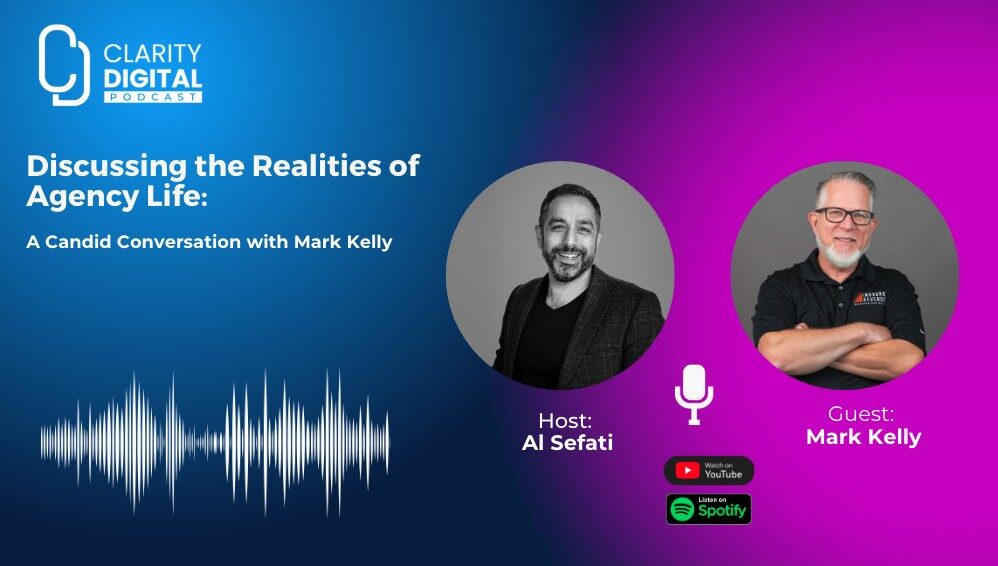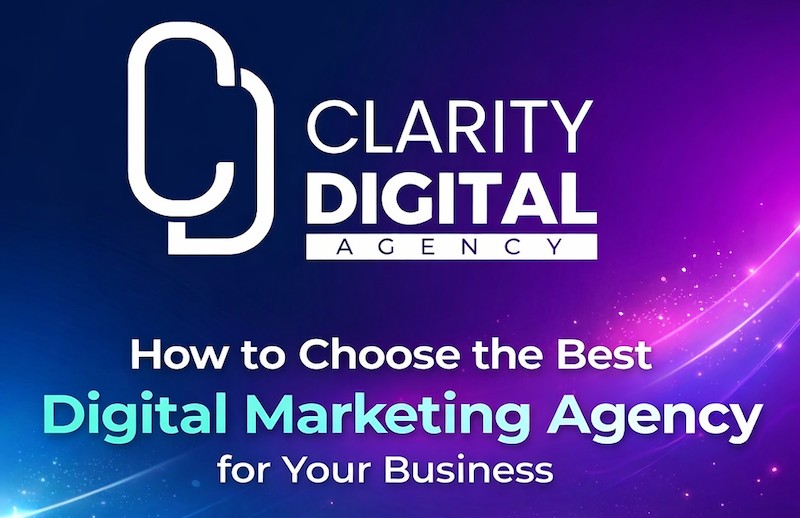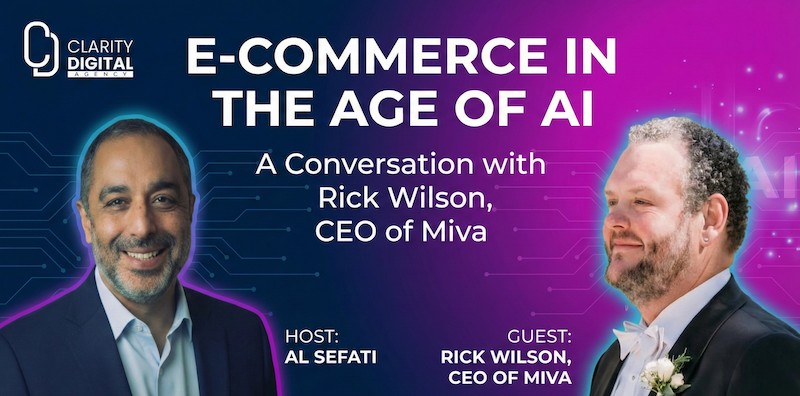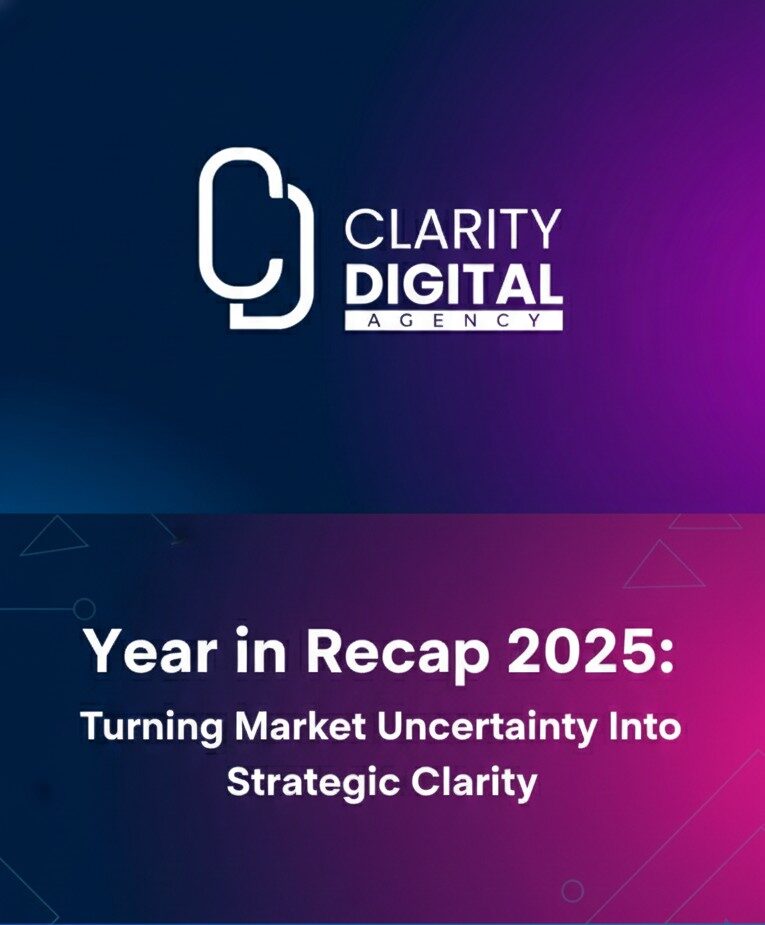Growing and running an agency is one of the most rewarding and challenging business models anyone can choose. Behind every glossy sales pitch and “agency success” LinkedIn post lies a constant balancing act: client demands, operational chaos, team management, and the evolving realities of digital marketing itself.
That’s the heart of the conversation I recently had with Mark Kelly, founder of Inbound Revenue, during his second appearance on the Clarity Digital Podcast.
Mark brings over a decade of agency experience, starting as a solo contractor and eventually building a white-label agency specializing in Google Ads, Facebook Ads, and Local Services Ads. In this conversation, we covered everything — the reality of transitioning from contractor to agency owner, why scaling isn’t always the answer, the importance of defining your services, client relationship challenges, lead generation realities, and the lessons we both learned the hard way.
If you are considering agency ownership, currently running one, or trying to grow a consulting business into something bigger, this is a conversation worth watching
And below is the summary of the video above:
From Independent Contractor to Agency Owner: The Realities No One Tells You About
Mark didn’t start out planning to build an agency. Like many of us, he was working a corporate IT job while running side projects, including a successful e-commerce store where he learned Google Ads firsthand. After the collapse of the newspaper industry and the 2008 recession, he leaned fully into marketing consulting — simply because it was easier to find marketing work than land another IT role.
At first, he enjoyed the freedom and control that comes from solo consulting. But as demand grew, so did the temptation to “scale” by hiring.
Mistake #1: Hiring people without first building clear operational processes.
Mark emphasized a key lesson that’s still painfully true today:
“If you hire before you build processes, you’re just multiplying the chaos.”
Without a clear system for onboarding, project management, communication, and deliverables, adding more people just makes your workload heavier — not lighter.
This was one of the first major forks in the road that separates successful agency owners from those who burn out.
Understanding the True Cost of Growing an Agency Versus Staying a Consultant
Both Mark and I agreed: consulting is often underestimated.
Solo consulting offers higher margins, less overhead, and the ability to focus deeply on craft.
Agencies, by contrast, require building infrastructure — and not just for delivery, but for sales, operations, finance, and customer success.
Mark admitted something that few agency owners say out loud:
“Running an agency isn’t necessarily more profitable unless you scale into the seven-figure range. It’s just more responsibility.”
The title of “agency owner” sounds prestigious. But the reality is often nights spent worrying about payroll, software bills, churned clients, and a thousand tiny fires that don’t exist when you’re just selling your own expertise.
Choosing between consulting and agency-building isn’t just a question of ambition — it’s about deciding what kind of business you truly want to run.
The Critical Importance of Saying No to Non-Core Services and Client Demands
One of the hardest lessons both of us learned is the power of saying “no” — and the price you pay when you fail to do so.
In the early stages of agency growth, it feels reckless to turn down work. After all, every client relationship is hard-won. When a client asks for something adjacent — like website design, organic social media, or marketing automation — it’s tempting to say yes, even if it’s not your core expertise.
Mark shared how he structured his agency to offer only a few highly productized services:
- Google Ads Management
- Facebook Ads and Local Services Ads
Everything else is politely declined or referred out.
The result? Higher profitability, better client satisfaction, and far fewer operational headaches.
He framed it simply:
“If Chick-fil-A doesn’t sell roast beef sandwiches, why should your agency try to be everything to everybody?”
Defining your service offerings — and having the discipline to stick to them — is the only way to scale without burning out your team, your margins, or your reputation.
Productizing Digital Marketing Services to Improve Profitability and Operational Efficiency
I opened up about my ongoing challenge at Clarity Digital: how hard it is to fully productize services when client needs vary so widely. Even within SEO alone, clients may need vastly different things — technical SEO, content creation, digital PR (link building), or on-site optimization.
Mark offered a valuable perspective:
You don’t need one massive package that fits everyone. Instead, create clear, modular service products. Define:
- What the service includes
- What it does not include
- How it’s delivered
- How it’s priced
This level of clarity allows clients to pick what they need — and prevents your team from getting sucked into endless custom work that destroys margins and timelines.
When everything is bespoke, you’re reinventing the wheel every time. When services are productized, you’re running a business with predictable processes and outcomes.
Hiring for Digital Marketing Agencies: Why Most Agencies Struggle to Build the Right Teams
Hiring remains one of the biggest challenges for agencies of all sizes.
Mark described a straightforward but disciplined approach:
- Start with Upwork to source talent.
- Always have an operations leader or project manager conduct the first interview to filter candidates (especially important when the founder tends to like “too many” people).
- Begin every hire with part-time or project-based work before committing to full-time.
He emphasized the importance of hiring for process fit — not just technical skills.
It’s easier to teach a capable person how to use a tool than it is to fix poor communication, lack of accountability, or sloppy attention to detail.
This is a mistake many of us (myself included) make early on: hiring based purely on resumes or skill tests without assessing how someone fits into your system, your culture, and your expectations.
Lead Generation for Agencies: Why Google Ads Alone Is Rarely the Answer
Both of us have run ads for our own agencies. And both of us admitted that it’s brutally difficult — even for seasoned marketers.
The truth is that selling marketing services to other marketers (or business owners inundated with marketing pitches) is expensive, competitive, and often inefficient.
Mark shared that his best lead sources over the years have been:
- Facebook Groups (where he actively participates, not just pitches)
- YouTube Thought Leadership Content
- Consistent Email Marketing to His List
- Old-Fashioned Referrals
He pointed out that hyper-niched agencies — those focusing on a specific vertical like dental, legal, or landscaping — have an easier time running profitable ads and winning deals.
Generalist agencies face an uphill battle because they’re competing against hundreds, if not thousands, of others for the same attention.
Launching AgencyFinder.biz: A New Solution for Agency Visibility and Client Lead Generation
Mark recently launched AgencyFinder.biz, now the largest agency directory in the United States focused specifically on marketing and digital service agencies.
The platform is designed to give agencies more visibility, allow clients to find vetted service providers, and eventually create opportunities for direct client-agency matchmaking.
For agencies struggling with lead generation, it offers another distribution channel — and early adopters can list themselves for free.
It’s an ambitious project, but one that fills a real gap in the market, especially for small to mid-sized agencies without large marketing budgets.
Key Takeaways for Consultants, Agency Owners, and Marketing Entrepreneurs
After decades between us in consulting and agency life, the lessons Mark and I discussed boil down to a few core truths:
- Consulting and contracting are not stepping stones; they can be highly profitable long-term paths.
- If you do choose to build an agency, build processes before building a team.
- Define what you do and what you do not do — and stick to it.
- Productize services wherever possible to create repeatable, scalable systems.
- Lead generation is an ongoing discipline, not a one-time tactic.
- Stay humble, stay learning, and remember: no client is worth sacrificing your integrity, sanity, or operational focus.
The more clearly you define your agency’s identity, services, and ideal clients, the easier it becomes to grow — and the less energy you waste chasing every shiny opportunity that comes along.
Conclusion
Thank you again to Mark Kelly for joining me on the Clarity Digital Podcast for a truly insightful, honest conversation about what it really takes to build and grow a successful digital marketing agency today.
To learn more about Mark’s work, visit Inbound Revenue and explore Agency Finder if you’re an agency owner looking for new ways to expand your visibility and generate quality leads.
Watch the full episode below, and be sure to subscribe to the Clarity Digital Podcast for more unfiltered conversations about business, marketing, leadership, and growth in today’s changing landscape.





